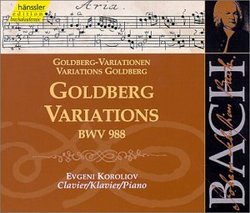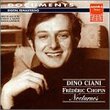| All Artists: Johann Sebastian Bach, Evgeni Koroliov Title: Bach: Goldberg Variations BWV 988 (Edition Bachakademie Vol 112) /Koroliov (piano) Members Wishing: 0 Total Copies: 0 Label: Hanssler Classics Release Date: 10/19/1999 Genre: Classical Styles: Chamber Music, Historical Periods, Baroque (c.1600-1750), Classical (c.1770-1830) Number of Discs: 2 SwapaCD Credits: 2 UPCs: 040888211228, 4010276016120 |
Search - Johann Sebastian Bach, Evgeni Koroliov :: Bach: Goldberg Variations BWV 988 (Edition Bachakademie Vol 112) /Koroliov (piano)
 | Johann Sebastian Bach, Evgeni Koroliov Bach: Goldberg Variations BWV 988 (Edition Bachakademie Vol 112) /Koroliov (piano) Genre: Classical
|
Larger Image |
CD DetailsSimilar CDs
|
CD ReviewsA Very Solid Effort Snow Leopard | Urbana, IL | 11/26/2006 (4 out of 5 stars) "In the world of variations on Goldberg Variations, the essential question is why any given recording should join one's collection. From the reviews below, one would have to conclude that this disc is essential. Whether this is so or not will very much depend on what you want from a Goldberg recording. Although Gould is still very much something of a benchmark for this work, the sound quality of them pits them in an uphill battle with much more ably recorded later editions. For this particular disc, the piano seems to have a very bright tone to it, which is muted somewhat by what seems to be rather a lot of reverb. Also, on average it seems to be engineered at a rather higher volume than normal. A side-by-side comparison of pieces with the Gavrilov recording really makes the "brightness" and "echo" of the Koroliov disc that much more apparent. Over the course of the disc, this can sometimes be a bit wearying. As for the playing, I find the descriptions of the other reviewers rather misleading. In the following, then, comparisons with Gavrilov are solely for the purpose of providing a benchmark or contrast. Because there is no doubt that Koroliov turns in a very able reading here, but in the main what stands out more than the lightning tempos of the more notoriously fast variations (No. 5, and No. 20 in particular) is the slowness of others (particularly No. 19 and 13). The aria is nearly 5 minutes long--not a record, but still always a bit amazing for a piece of music that is one page long. Slow arias are rather common--even Gavrilov's is 4'48"; Koroliov's decision not to play the repeat in the reprise is, as a result, a bit welcome. Additionally, Variation 19, at 2' 18", is almost double Gould's (who wasn't playing repeats), and almost three times longer than Gavrilov (who does play the repeats). Of course, the point is not merely how long a piece is in performance, but what is brought out at the particular tempo in question. At 2'18", the stateliness of Variation 19 is going to be a very different creature than at Gavrilov's 53". For No. 19 in particular, Koroliov opts for a smooth-staccato contrast in the repeats. One is grateful for this contrast, since the piece otherwise seems to be moving along so slowly. This is not to say that the slower pieces necessarily drag, but they have a much harder time generating spontaneous or rapturous kinds of reactions either to the sheer virtuosity or the contrapuntal details brought out by faster, or much faster, tempos. Similarly, the amazement of the reviewers at the warp-speed of the faster Variations is a bit curious. Of the 32 pieces, only Variation 21 is faster by Koroliov (3'26") compared to Gavrilov (3'45"). By contrast, besides Koroliov's much slower No. 19, No. 13 is also much longer (5'41", compared to 2'43" in Gavrilov), making the skittery jig of the latter into a laconic two-step in the former. With Variation 29, at only 2/3s of Gavrilov's tempo, the piece does indeed seem to lose most of its verve and melt into a somewhat precious collection of runs. Again, the purpose of the contrast here is simply to qualify the other reviewer's claims for "breath-taking" speed; certainly it is Gavrilov in 29 who displays marvelous quantities of "zoom". As such, if you happen to own Gavrilov and find the tempos a tad too fast most of the time, this disc should be very pleasing. Picking on tempos might seem to be gratuitous, but these pieces are particularly sensitive to tempo choices--tempo plays a tremendous role in how one hears the various contrapuntal elements (when the player brings them out). One could say, additionally, that the playing does, as one reviewer claim, show inventiveness, but almost none of the sheer theatricality one finds in Gavrilov. Listening to this disc, its pleasures are more precious or cerebral than visceral. This works particularly well in Variation 25 (the famous "Black Pearl"), creating somewhat more aridity (or, perhaps more accurately, avoiding sentimentality) than is typical. This disc has a certain ... charm is not quite the right word. I don't find that it particularly rewards close listening--all classical music rewards close listening more or less, to a lesser or greater degree--and it functions better for me as music to be played while reading or writing. One of the reasons for this is, ultimately, the brightness and echo of the piano. It sounds pleasant and clear at the outset, but begins to be too much after a while. In the final analysis, this is very solid disc--one that might have benefited from some loosening, or perhaps more inspiration." A brilliantly controlled, inventive performance 07/10/2004 (5 out of 5 stars) "This is an awesome performance. The Glenn Gould recordings (1981 in particular) are very special recordings for me and despite their idiosyncracies I would still take them to a desert island before Koroliov's. Nevertheless, Koroliov's is the more immediately accessible recording. It's remarkably controlled from the first note to last yet highly lively. He plays all the repeats, often with beautifully chosen and executed ornamentation. A flawless recording that will be amongst the leading Goldbergs for several decades and perhaps beyond." Desert Island Disc Byron Williams | Ithaca, NY USA | 11/02/2006 (5 out of 5 stars) "This is the Goldberg Variations at its best. I've listened to several interpretations, including the Goulds, but this one really is at the top. I hadn't heard of Koroliov before I bought this, but now I'm going to look for more of his Bach interpretations. I've listened to this disc probably around 20 times already and I'm constantly finding new things, new nuances and harmonies. This one is going to stand the test of time. Koroliov runs the gamut of emotions from the slow, frozen "Black Pearl" variation to the extremely fast and virtuoso variations, he really flies through some of them - it almost doesn't seem humanly possible to play like that. All together an incredible performance!"
|

 Track Listings (16) - Disc #1
Track Listings (16) - Disc #1


